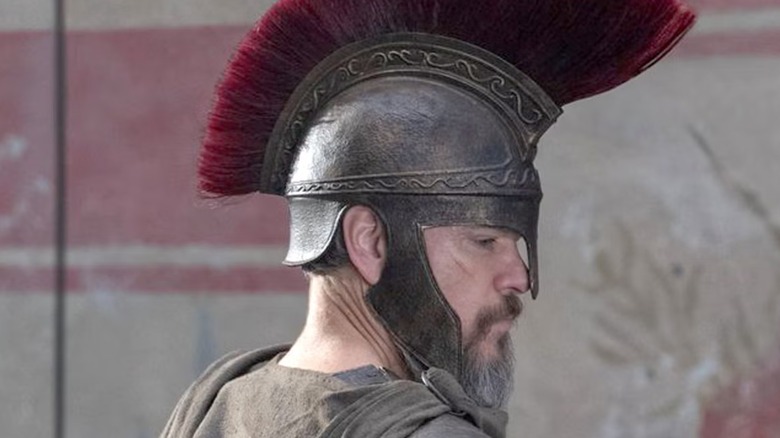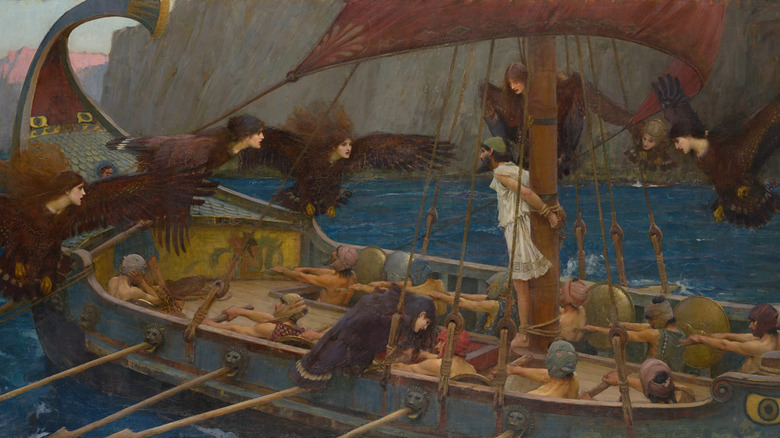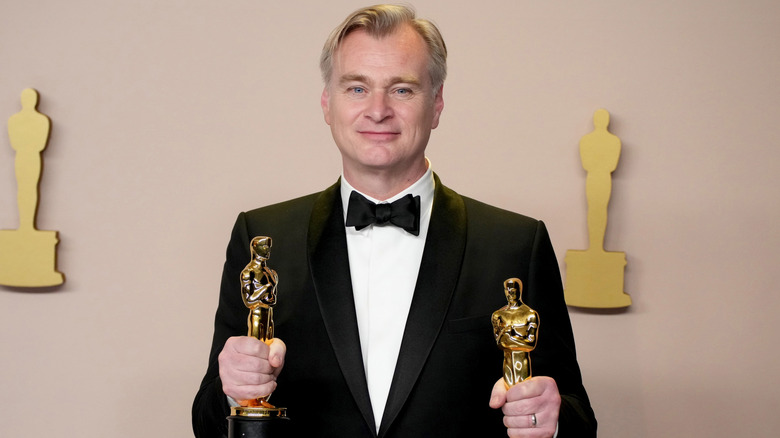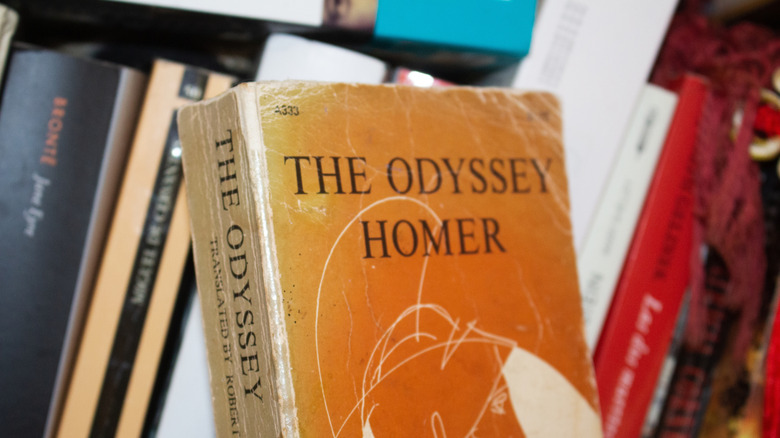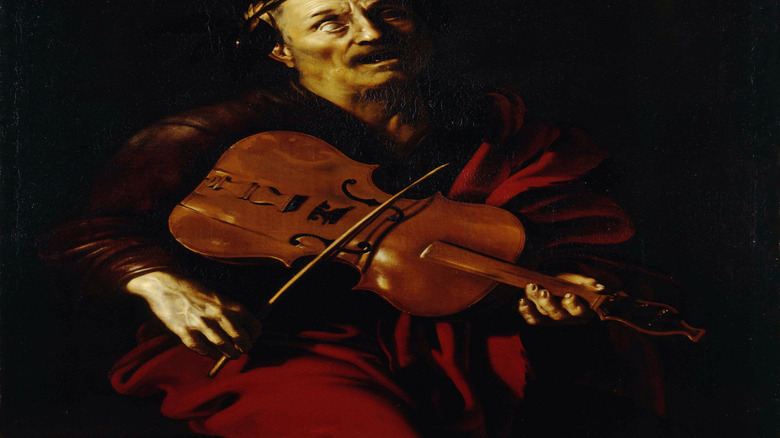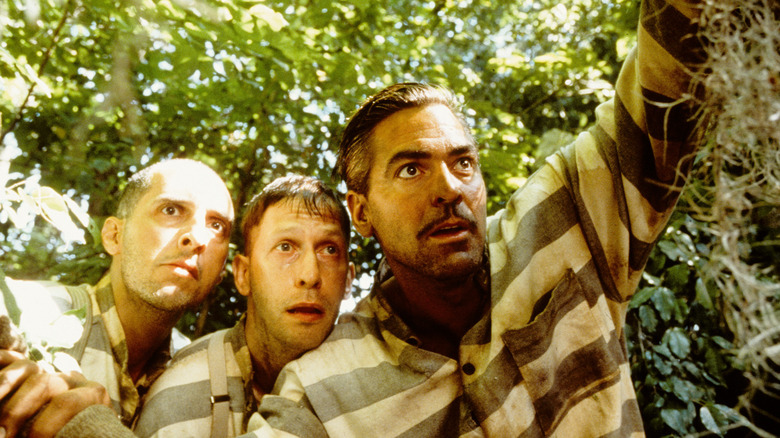The Odyssey: Everything We Know About The Christopher Nolan Movie
Award-winning director Christopher Nolan is no stranger to massive projects, but his adaptation of "The Odyssey" will probably be his biggest undertaking yet. The director behind "The Dark Knight," "Inception," and "Oppenheimer," (just to name a few of his blockbuster films) is taking on Homer's epic poem, and filming is already underway for the project — which is set to release in 2026 (as of this writing).
So what do we need to know about "The Odyssey" before it hits theaters and, in all likelihood, blows critics and audiences away? If you didn't have to read "The Odyssey" for any of your high school English classes, I'll also go over the basic plot points of "The Odyssey," remind you that it is, in fact, a sequel — to another of Homer's poems — and talk about some straightforward and wildly divergent adaptations of this famous story. Here's everything you need to know about Christopher Nolan's take on "The Odyssey."
What are the plot details of The Odyssey?
The fact that an arduous journey is now colloquially referred to as an "odyssey" should tell you that Homer's story has remained relevant for literal centuries, but what specifically happens in "The Odyssey" as it was originally written? The story centers on Odysseus, a soldier and the king of Ithaca who left to fight in the Trojan War and hasn't been able to return home to see his wife Penelope for a full decade. While Penelope and her 20-year-old son by Odysseus, Telemachus, remain in Ithaca — and a ton of suitors vy for her hand, believing that Odysseus was lost at sea after he royally pissed off the god of the ocean, Poseidon. Odysseus struggles to get home, but doesn't know Telemachus is cavorting around with gods and pulling some strings to make that possible.
To say that Odysseus' journey home isn't easy is an understatement. Not only is he held captive by Calypso on an island for seven more years — because she's madly in love with him — but he and his men are tricked by lotus-eaters (who make them forget their mission), ensnared by sirens, trapped in a cave by a boulder-wielding, one-eyed giant named Polyphemus, get tricked again by Circe — who turns his men into swine — and fought a whirlpool (Charybdis) and a six-headed monster (Scylla). When Odysseus finally gets back to Ithaca, he approaches Penelope disguised as a beggar ... but when she challenges her suitors to fire her husband's bow and arrow, only Odysseus can actually do it, and the couple finally reunites. Also, Telemachus murders a whole bunch of those suitors alongside his dad, so I guess that's also heartwarming in its own way.
Who is the cast of The Odyssey?
The cast of Christopher Nolan's version of "The Odyssey" is, to put it lightly, freakin' stacked. We don't know who anyone is playing as of this writing, with one exception: Matt Damon will take on the lead role of Odysseus. So, who will appear alongside Damon?
Real-life couple Tom Holland and Zendaya will both appear in the film — and based on some set photos, it's a reasonable bet that Holland will play Telemachus. As for the rest of the cast, buckle up. Anne Hathaway, Robert Pattinson, Himesh Patel, Benny Safdie, and Elliot Page are five of the high-profile cast members who have worked with Nolan before (Hathaway appeared as Catwoman in "The Dark Knight Rises," Pattinson and Patel were in "Tenet," Safdie played a major supporting role in "Oppenheimer," and Elliot Page memorably appeared as Ariadne, a character who takes their name from Greek mythology, in "Inception").
All of these fine folks will be joined by Oscar winners Lupita Nyong'o and Charlize Theron, breakout horror star Mia Goth, "The Bear" and "Punisher" lead Jon Bernthal, prolific actor and writer John Leguizamo, newly minted "Shogun" star Cosmo Jarvis, "Straight Outta Compton" star Corey Hawkins, and venerable Hollywood stars Bill Irwin and Samantha Morton. (This is, astonishingly, not even a complete list.) This cast is already enormous even without specific character details, and it's not out of the question that Nolan could add a few more names to his roster.
Why Christopher Nolan adapting The Odyssey is a big deal
Ever since this version of "The Odyssey" was officially announced in December of 2024, the real excitement about the project has centered around Christopher Nolan. In fact, all we knew about Nolan's project at first is that he started developing it at Universal Pictures after working with the studio for "Oppenheimer" — after a very public split from Warner Bros. over their wide release of "Tenet" during the COVID-19 pandemic — and Tom Holland and Matt Damon were revealed as two of the project's stars before anyone even knew it was, in fact, "The Odyssey." So why is it so important that Nolan is the one to tackle this version of one of history's most famous stories?
Nolan knows how to create spectacle on a massive scale, and he's been honing this particular skill as a director for decades. His early projects, like 1998's "Following," 2000's "Memento," and even 2006's "The Prestige" were much smaller stories compared to his later efforts. When he took on the Caped Crusader, he helped create a gritty new standard-bearer for all "Batman" movies that followed (you cannot even try to deny that Matt Reeves' 2022 reboot "The Batman," which stars Nolan's guy Robert Pattinson, wasn't heavily influenced by Nolan's vision in his trilogy). With projects like "Inception" in 2010 and "Interstellar" in 2014, Nolan considerably widened his scope ... but for my money, the way he directed approached 2023's "Oppenheimer" best illustrates why he's the perfect director for "The Odyssey."
"Oppenheimer" is, on some level, a story of J. Robert Oppenheimer's (Cillian Murphy) personal and professional journey, but the movie's most striking sequence, without question, is the first test of the atomic bomb. The careful and incredibly thoughtful way that Nolan shot this scene — right down to the loudest cinematic silence in history when the bomb actually detonates — makes it quite clear that, after years in the business, Nolan can handle a story with truly enormous scope and scale, so I have all the faith in the world that his vision of "The Odyssey" will be nothing short of spectacular. You should feel that way, too — we're in good hands with Nolan based on the sheer fact that his body of work has grown more and more ambitious with every single project.
What is the source material for The Odyssey?
Once again, Christopher Nolan's "The Odyssey" is based on Homer's epic poem, the origins of which can be traced to 725–675 BCE (according to the Encyclopedia Britannica). As the encyclopedia notes, the poem was always intended to be performed by an orator — which makes sense when you consider that it's been adapted so many times, but I'll circle back to that point shortly — and it was originally made up of over 12,000 lines of text written in a style known as "dactylic hexameter" that eventually came to be known as "Homeric hexameter" thanks to the poet's strong influence. What does that mean? In Homeric hexameter, "each line consisted of six feet, or metrical units, and each foot consisted of a dactyl (a stressed syllable followed by two unstressed syllables)."
"The Odyssey" was also originally so massive that it spanned a whopping 24 books by our modern metrics; back in Homer's time, the poem was written on scrolls that were probably made out of animal skins. Some scholars also question how large a role Homer himself played in the creation of "The Odyssey," and this belief is known as the "Homeric question." The text has been translated many, many times across centuries, including by literary luminaries like Alexander Pope and Samuel Butler; in 2017, Emily Wilson made history as the first-ever female translator to bring "The Odyssey" to an English-speaking audience. You might think that all translated versions of "The Odyssey" are identical, but that's actually not the case at all, as each translator brings a sort of unique sensibility to their own version.
Does The Odyssey belong to a cinematic universe/canon?
Sequels have been around for a really long time, and as it happens, "The Odyssey" is a sequel to one of Homer's other extremely famous epic poems: "The Iliad." You may recall that "The Odyssey" begins right after the end of the Trojan War, and so you likely won't be surprised to hear that "The Iliad" focuses on the Trojan War itself (albeit, the ending as it pertains to the poem's main character Achilles).
"The Iliad" focuses on the Achean forces — specifically, Achilles and Agamemnon, the strongest warrior of those forces and its leader, respectively — and how, when these two guys kidnap two maidens named Chryseis and Briseis, they inadvertently piss off the gods. (Chryseis and Briseis' father Chryses happens to be a priest of the Greek god Apollo, so he asks his boss to wreak havoc on the men.) Eventually, Achilles turns heel (get it?!) and tries to work alongside Zeus, the king of the Greek gods, to defeat them; in the meantime, an uneasy ceasefire between the Acheans and their enemies, the Trojans, is broken and the bloodshed truly begins.
The way this all wraps up is Achilles starts working with his original dudes in the Acheans again, kills Hector — his counterpart in the Trojan army — and achieves victory. He also does some horrifying stuff with Hector's dead body before the gods yell at him, and once he backs off, another fragile peace accord takes place between the Acheans and Trojans. Again, "The Odyssey" takes place after all this stuff happens.
Are there other adaptations of The Odyssey?
With all of this in mind, it's probably not shocking that there are actually a lot of adaptations of "The Odyssey" out there already. The most famous literary adaptation, "Ulysses," was written by James Joyce in 1922, and some others are relatively straightforward, like the 1997 miniseries of the same title that stars Armand Assante as Odysseus. In the 2002 episode "Tales from the Public Domain," even "The Simpsons" presented a relatively faithful retelling of the source material. Some adaptations of "The Odyssey" take a very different approach, though.
In 2000, the Coen brothers released their take on "The Odyssey" titled "O Brother, Where Art Thou?" starring George Clooney, John Turturro, and Tim Blake Nelson, which I'll argue is actually the first of their odes to Homer's work (stay with me here) and even names Clooney's character Ulysses, following his journey as he tries to reunite with his wife Penny (Holly Hunter) after escaping from prison. Technically, we could also consider "Cold Mountain," which tells the story of a Confederate deserter named W.P. Inman (Jude Law) who wants nothing more than to return to his own wife Ada Monroe (Nicole Kidman). In 2013, the Coen brothers' film "Inside Llewyn Davis" tells the story of the titular musician (Oscar Isaac) who has to overcome obstacles not to seek out his long-lost wife, but perform his music for an agent ... and along the way, he finds himself transporting a cat named Ulysses. (I do not think that's a coincidence in the slightest!) "The Odyssey" remains a constant inspiration for filmmakers because in 2024, "The Return," directed by Uberto Pasolini, cast Ralph Fiennes as Odysseus and Juliette Binoche as his beloved Penelope.
Christopher Nolan's adaptation of "The Odyssey" is expected on July 17, 2026.
